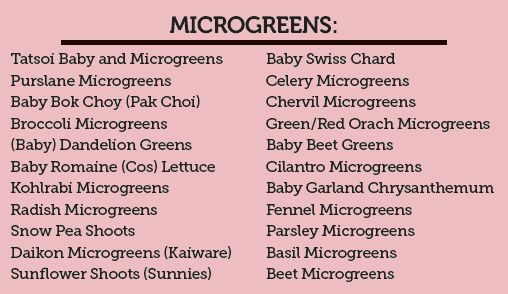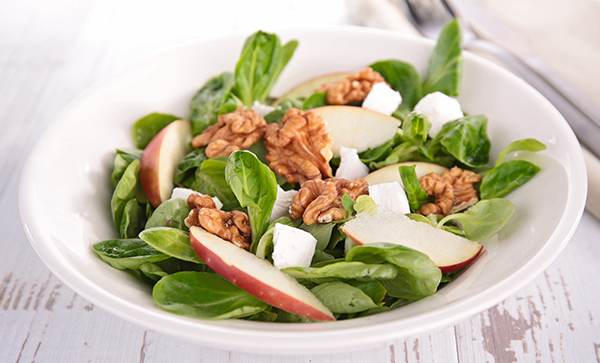By Tami Charbonnet
Microgreens are commonly used on salads, soups, appetizers, and as artistic garnishes in fine dining restaurants. While they are often considered merely aesthetic, there are significant health benefits found within these tiny super food delicacies. Scientific research proves these seedlings are nutrient dense and contain important antioxidants.
 Microgreens are edible seedlings harvested at the cotyledon leaf stage. According to studies at the University of Maryland and the U.S. Department of Agriculture, microgreen cotyledon leaves have considerably higher nutritional densities than mature leaves. Researchers discovered health-promoting benefits from consumption of microgreens, including a high antioxidant capacity and an abundance of vitamin C to help protect your body from the harmful effects of free radicals.
Microgreens are edible seedlings harvested at the cotyledon leaf stage. According to studies at the University of Maryland and the U.S. Department of Agriculture, microgreen cotyledon leaves have considerably higher nutritional densities than mature leaves. Researchers discovered health-promoting benefits from consumption of microgreens, including a high antioxidant capacity and an abundance of vitamin C to help protect your body from the harmful effects of free radicals.
Researchers at the U.S. Department of Agriculture report that red cabbage microgreens had the highest levels of vitamin C among the tested varieties, with a 100-gram portion providing 147 milligrams of this vital nutrient. For comparison, an equal-sized serving of mature raw red cabbage contains 57 milligrams of vitamin C.
Microgreens are also rich in the carotenoid, beta-carotene, which may help reduce risk of disease, such as cancer and eye disease. Many microgreens contain more beta-carotene than carrots- 12 milligrams per 100 grams compared with 8 milligrams in boiled carrots. Researchers who analyzed the beta-carotene content of microgreens found these super-nutritious greens also provide carotenoids such as lutein and zeaxanthin.
Researchers at Yale University found that microgreens are a great source of vitamin E. According to scientists, “The recommended daily allowance for vitamin E is 15 milligrams of alphatocopherol, meaning that eating just a small amount of daikon radish microgreens would cover your daily requirement for this important antioxidant vitamin.”
Although microgreens are small, they pack an impressive punch of condensed nutrient density. Vitamin K is also found in abundance among these tiny seedlings, offering health benefits by “promoting normal blood clotting and preventing excessive bruising. Vitamin K also plays an important role in maintaining strong and healthy bones.”
 Nutrient Dense Macro-salad
Nutrient Dense Macro-salad
- 4 cups of your favorite microgreens
- ½ cup strawberries
- ½ cup thinly sliced granny smith apples
- 2 tablespoons sunflower seeds
- 1 tbsps chopped walnuts
- Combine microgreen mixture in a large deep bowl
- Add strawberries, apples, sunflower seeds, and walnuts to mixture
- Drizzle your favorite vinaigrette dressing lightly over the salad or simplify with a splash of good balsamic vinegar and touch of extra virgin olive oil.



